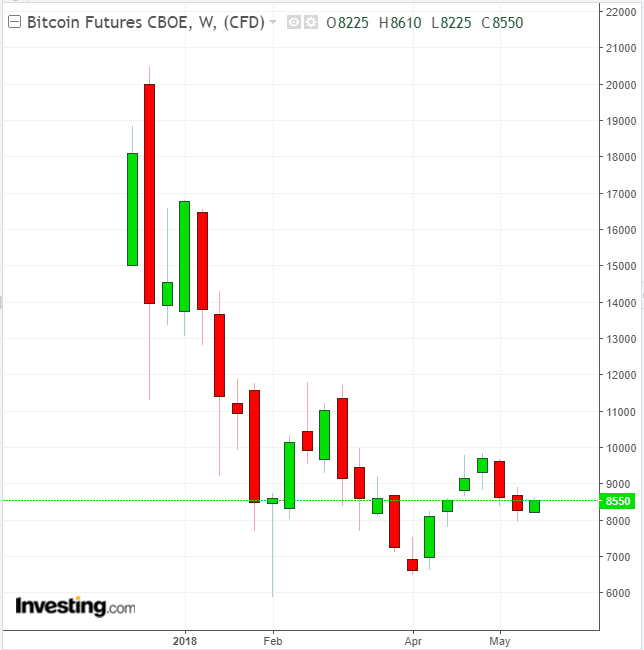When CBOE Global Markets (NASDAQ:CBOE) announced the launch of CBOE Bitcoin (XBT) futures trading in December 2017, many believed it would be a game-changer for cryptocurrency uptake, validating Bitcoin's position as an asset class and investment.

Fast forward to May 2018. Nearly 680,000 contracts have been traded since the launch across five settlements, representing a notional value of more than $6.85 billion. The most recent settlement price was $8.238.49. That's all good news, but volume growth on the XBT futures exchange hasn't been monumental. As well, Bitcoin pricing hasn't exactly exploded either.
Still, in late April the CBOE saw its highest-ever trading volume for Bitcoin futures contracts. During the same period, CBOE announced they want to lower their Bitcoin futures increments on contracts from 10 points ($10) to 5 points ($5). A letter proposing this rule amendment was sent to the Commodity Futures Trading Commission (CFTC) on April 17, with the intention that it would go into effect sometime on or after May 1, though the final decision has not yet been announced.
Though the new amendment would only impact single transactions, it's still a significant move. Dong Yanfgan, co-founder of ZAN Chain says the effect of reducing BTC's increment price per future contract should increase market participation and improve competition. He notes that the decision for CBOE to initiate this change was supported by the data collected by the company since the contract was launched in December. ”I believe the effect of reducing BTC's increment price per future contract should increase market participation and improve competition. That is the main purpose of CFE to promote this change,” says Yangfan.
Mathias Goldmann, advisor to Constellation, a horizontally scalable platform protocol, points out that CBOE Bitcoin futures have not seen as much trading volume, nor garnered as much attention as some would have hoped when futures trading in the most popular cryptocurrency first started.
“Trading volume ranges between 50-100m USD daily. Given that the total BTC marketcap is roughly $145 billion and today’s BTC trading volume alone is $6.6 billion, this number is quite small. Compared to the S&P futures daily trade volume, BTC futures only have less than 5% of that trade volume on the CBOE.”
Goldmann believes lowering the minimum increments serves two purposes: Pricing becomes more accurate and thus moves closer to the underlying asset's own price. Which in turn leads to more precise price discovery. He speculates that this request may have come from institutional players hoping to narrow the price increments.
“Most established future pricing increments range across cents (e.g 5, 25,50 cents). For comparison, on older and more established BTC futures exchanges like Bitmex and Okcoin, BTC futures are already priced in 1 USD increments. Generally tighter price increments means a lower spread. That will likely attract new participants and money in the BTC futures market.”
Transparency, Liquidity, Efficient Pricing
Lowering the Bitcoin futures entry point may also push the price higher in the short-term points out Gabriele Giancola, co-founder and CEO of blockchain-powered loyalty ecosystem qiibee, However, the longer term impact on prices is harder to predict, he says. Nevertheless, a boost in Bitcoin prices, even over the shorter time, will further push its acceptance as a valid asset class.
Successful Bitcoin futures trading that takes place via regulated—and trusted—public exchanges gives people who were previously skeptical about the lack of regulation the confidence to invest.
There’s also the belief that Bitcoin futures provide transparency, liquidity and efficient pricing to the sector, enabling investors to speculate on the price of Bitcoin without actually having to own the cryptocurrency itself. While Bitcoin remains unregulated, Bitcoin futures can be traded on regulated exchanges, which is good news for those concerned about the risks related to the industry’s still fluid regulation.
It's Giancola's view that long-term future pricing options have been touted as a vote of confidence for the virtual currency economy, potentially paving the way for lower market volatility, which would further increase investment over time. So, the CBOE’s move to lower the Bitcoin futures increment is actually quite a significant step towards ensuring that Bitcoin becomes more widely accepted.
Not everyone agrees though. Rob May, CEO of BotChain, a decentralized identity registry for bots, says it's too soon to gauge the significance of this move, particularly in terms of industry-wide impact. However, he sees the request for reduction of minimum increments as a reflection of the industry’s rapidly growing market liquidity.
Still a Learning Curve
Eiland Glover, CEO and co-founder of Kowala, an autonomously stabilized cryptocurrency, also believes this change should increase trading. As Glover sees it, the CBOE is still learning about its own new product. Since their futures trading product was just launched in December, CBOE is likely still gathering data even as they continue fine tuning the details. It would be expected that they'll continue reviewing results in order to see what still needs to be altered.
